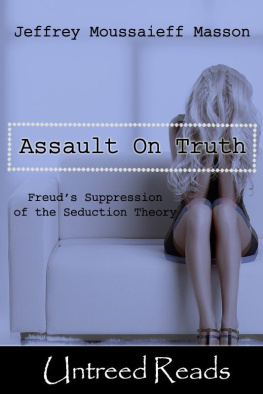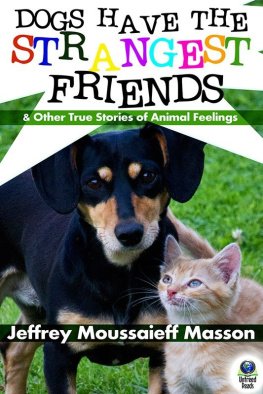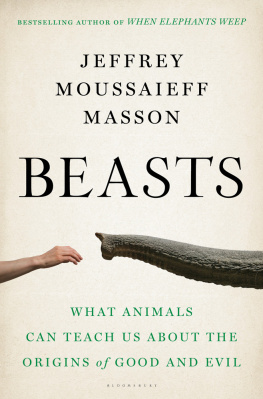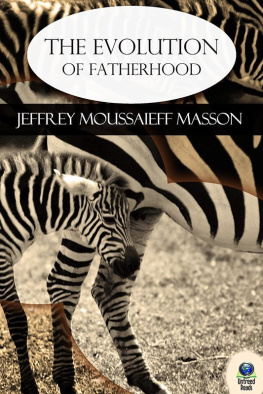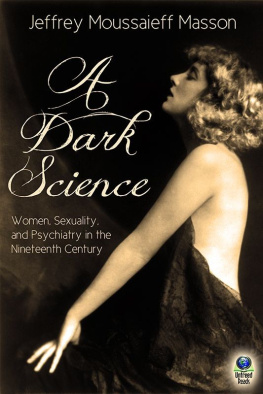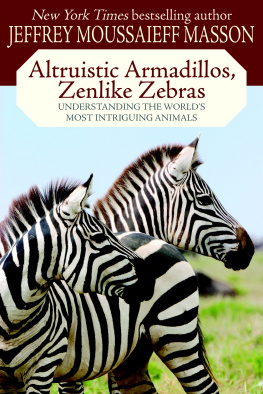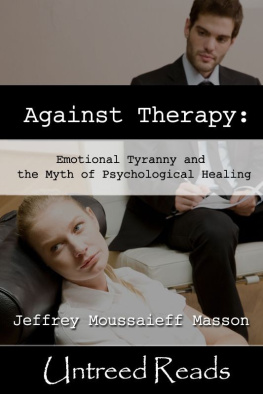Jeffrey Moussaieff Masson - When elephants weep: the emotional lives of animals
Here you can read online Jeffrey Moussaieff Masson - When elephants weep: the emotional lives of animals full text of the book (entire story) in english for free. Download pdf and epub, get meaning, cover and reviews about this ebook. year: 1995, publisher: Delta, genre: Romance novel. Description of the work, (preface) as well as reviews are available. Best literature library LitArk.com created for fans of good reading and offers a wide selection of genres:
Romance novel
Science fiction
Adventure
Detective
Science
History
Home and family
Prose
Art
Politics
Computer
Non-fiction
Religion
Business
Children
Humor
Choose a favorite category and find really read worthwhile books. Enjoy immersion in the world of imagination, feel the emotions of the characters or learn something new for yourself, make an fascinating discovery.

- Book:When elephants weep: the emotional lives of animals
- Author:
- Publisher:Delta
- Genre:
- Year:1995
- Rating:5 / 5
- Favourites:Add to favourites
- Your mark:
- 100
- 1
- 2
- 3
- 4
- 5
When elephants weep: the emotional lives of animals: summary, description and annotation
We offer to read an annotation, description, summary or preface (depends on what the author of the book "When elephants weep: the emotional lives of animals" wrote himself). If you haven't found the necessary information about the book — write in the comments, we will try to find it.
Jeffrey Moussaieff Masson: author's other books
Who wrote When elephants weep: the emotional lives of animals? Find out the surname, the name of the author of the book and a list of all author's works by series.
When elephants weep: the emotional lives of animals — read online for free the complete book (whole text) full work
Below is the text of the book, divided by pages. System saving the place of the last page read, allows you to conveniently read the book "When elephants weep: the emotional lives of animals" online for free, without having to search again every time where you left off. Put a bookmark, and you can go to the page where you finished reading at any time.
Font size:
Interval:
Bookmark:
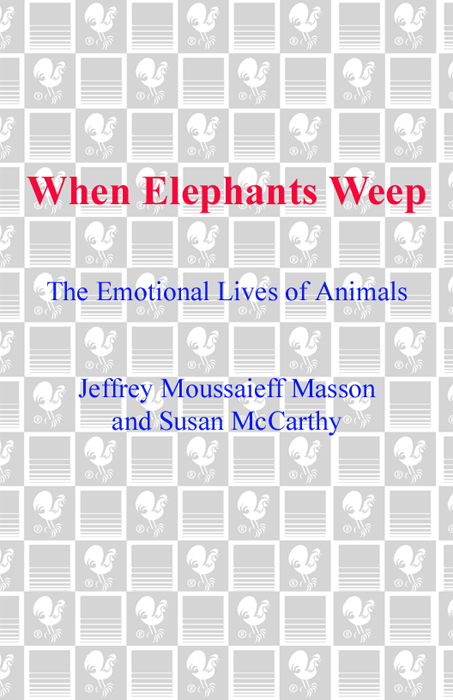
HIGH PRAISE FOR
THE STUNNING NEW YORK TIMES BESTSELLER
WHEN ELEPHANTS WEEP
by Jeffrey Moussaieff Masson and Susan McCarthy
A REMARKABLY ENGAGING, SURPRISINGLY RICH
portrait of emotions in the animal kingdom, its wealth of anecdotal evidence belying the scientific (and religious) cant that beasts cannot feel anger, love, jealousy, relief, curiosity, compassion.... No matter how you feel about the animal rights movement, this book will give you pause.
Sun-Times (Chicago)
In this impassioned volume [Masson and McCarthy] argue their case with intriguing examples culled from scientific literature.... In addition to offering a fascinating array of animals, it convincingly argues that their emotional life is an area worthy of scientific exploration.
People
WITH CAREFUL DOCUMENTATION AND A COPIOUS BIBLIOGRAPHY, [MASSON AND McCARTHY] OFFER COMPELLING EVIDENCE that animals possess sensibilities similar to our own.... When Elephants Weep presents persuasive evidence that while humans many think of themselves as at the top of the food chain, to use a term popularized in The Lion King, emotions are not their exclusive domain.
Detroit Free Press
FASCINATING... It contains the beginnings of a badly needed perspective, perhaps even a reordering of priorities. As a bonus, it is a wonderful, quick tour of the animal kingdom. A kind of nature lovers rendezvous with reality.
The Philadelphia Inquirer
FASCINATING, MOVING, REVEALING. A wonderful read and a must-have for anyone who cares about, or is in awe of, animals.
Alex Pacheco, president, PETA (People for the Ethical Treatment of Animals)
A FASCINATING EXPLORATION of the question: Do animals experience emotions?... Anyone who ever has bonded with a pet has reached his own conclusion, of course, but those who enjoyed Elizabeth Marshall Thomass The Hidden Life of Dogs will find new grist for thought here.
Richmond Times Dispatch
Jeffrey Masson and Susan McCarthy... take a radically humane position, displaying with compelling anecdotes what they take to be the moral quality of animal sympathy and the dignity of animal suffering.
The New Republic
I enjoyed When Elephants Weep enormously and consider it a milestone in the battle to try and make Homo sapiens realize that he is only one member of an enormous family.
Farley Mowat, author, Never Cry Wolf and Woman in the Mists
[Masson and McCarthy] have done their research carefully and make a compelling case.
Diversion
POWERFUL, SENSITIVE AND THOROUGH, When Elephants Weep constitutes a milestone in the human effort to explore the mysteries in the hearts of our fellow creatures. Packed with moving, careful observations, the book exposes truths we can no longer afford to ignore: that other animals emotional experiences may be as rich and varied as our own, and their lives worthy of our respect and reverence.
Sy Montgomery, author, Walking with the Great Apes and Spell of the Tiger
The authors make a convincing case that animals have complex inner lives that are constantly manifesting themselves in our world.
Outside (Santa Fe, N.M.)
A TRULY REMARKABLE BOOK... A lucid and readable introduction to the concept of animal emotions. They succeed in bridging the gap between the scientist, who is reluctant to acknowledge evidence of animal emotion, and the layperson, who more readily speaks of animals in emotional terms.... Highly recommended.
Library Journal
When Elephants Weep continues and brings into the twentieth century the work that Darwin began on the emotional lives of animals. Masson and McCarthy are not afraid to ascribe to animals the emotions that we feel: fear and hope, love and grief, joy and rage, shame and compassion, even an appreciation of beauty and a religious impulse. More important, they provide the evidence to justify these claims. This is a book that will make you see animals in a different waythe right way.
Pete Singer, author, Animal Liberation
Also by Jeffrey Moussaieff Masson:
MY FATHERS GURU:
A Journey Through Spirituality and Disillusion
FINAL ANALYSIS:
The Making and Unmaking of a Psychoanalyst
AGAINST THERAPY:
Emotional Tyranny and the Myth of Psychological Healing
A DARK SCIENCE:
Women, Sexuality and Psychiatry in the Nineteenth Century
THE ASSAULT ON TRUTH:
Freuds Suppression of the Seduction Theory
THE OCEANIC FEELING:
The Origins of Religious Sentiment in Ancient India
THE COMPLETE LETTERS OF SIGMUND FREUD
TO WILHELM FLIESS 18871904
(Editor)
THE PEACOCKS EGG: Love Poems from Ancient India
(Translations by W. S. Merwin, Editor)
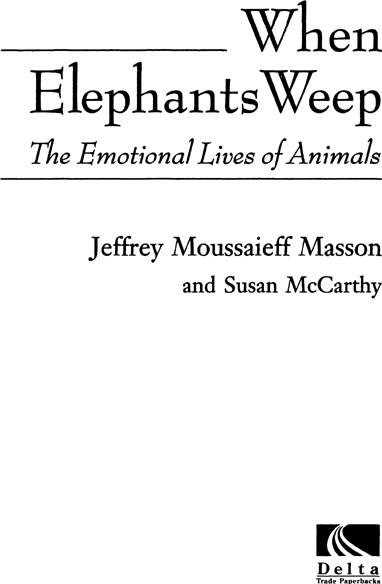
For the Fu
and Fiona
In the process of researching this book we talked to many scientists, animal trainers, and others whose expertise was invaluable. We would particularly like to acknowledge the help of George Archibald, Mattie Sue Athan, Luis Baptista, Kim Bartlett, John Beckman, Mark Bekoff, Tim Benneke, Joseph Berger, Nedim Buyukmihci, Lisa De Nault, Ralph Dennard, Pat Derby, Ian Dunbar, Mary Lynn Fischer, Maria Fitzgerald, Lois Flynne, Roger Fouts, William Frey II, Jane Goodall, Wendy Gordon, Donald Griffin, David Gucwa, Nancy Hall, Ralph Heifer, Abbie Angharad Hughes, Gerald Jacobs, William Jankowiak, Marti Kheel, Adriaan Kortlandt, Charles Lindholm, Sarah McCarthy, David Mech, Mary Midgley, Myrna Milani, Jim Mullen, Kenneth Norris, Cindy Ott-Bales, Joel Parrott, Irene Pepperberg, Leonard Plotnicov, Karen Reina of Bristol-Myers Squibb, Diana Reiss, Lynn Rogers, Vivian Siegel, Barbara Smuts, Elizabeth Marshall Thomas, Ron Whitfield, and Gerald S. Wilkinson, among others, for their patience in talking to us. We are also grateful to Jennifer Conroy, Joanne Ritter, Mike Del Ross, and Kathy Finger of Guide Dogs for the Blind in San Rafael. Any errors we have made and any wild speculations, particularly those deemed scientifically disreputable, are not to be laid at their doors.
More personal thanks are owed to our friends and family also for their support and real assistance, especially Daniel Gunther, Joseph Gunther, Kitty Rose McCarthy, Martha Coyote, John McCarthy, Mary Susan Kuhn, Andrew Gunther, Barbara and Gerald Gunther, Thomas Goldstein, Martin Levin, and Bernard Taper; and Daidie Donnelley, Fred Goode, Justine Juson, Marianne Lo-ring, Jane Matteson, Eileen Max, and Barbara Sonnenborn.
We also want to thank Elaine Markson for being a wonderful agent; Tony Colwell for having faith in this idea all along; Steve Ross for his enthusiasm and his indispensable help in making this the book it is; as for Kitty, only Kitty knows what Kitty is owed.
The Indian elephant is said sometimes to weep.
C HARLES D ARWIN
Animals cry. At least, they vocalize pain or distress, and in many cases seem to call for help. Most people believe, therefore, that animals can be unhappy and also that they have such primal feelings as happiness, anger, and fear. The ordinary layperson readily believes that his dog, her cat, their parrot or horse, feels. They not only believe it but have constant evidence of it before their eyes. All of us have extraordinary stories of animals we know well. But there is a tremendous gap between the commonsense viewpoint and that of official science on this subject. By dint of rigorous training and great efforts of the mind, most modern scientistsespecially those who study the behavior of animalshave succeeded in becoming almost blind to these matters.
Font size:
Interval:
Bookmark:
Similar books «When elephants weep: the emotional lives of animals»
Look at similar books to When elephants weep: the emotional lives of animals. We have selected literature similar in name and meaning in the hope of providing readers with more options to find new, interesting, not yet read works.
Discussion, reviews of the book When elephants weep: the emotional lives of animals and just readers' own opinions. Leave your comments, write what you think about the work, its meaning or the main characters. Specify what exactly you liked and what you didn't like, and why you think so.

